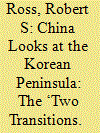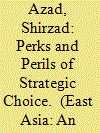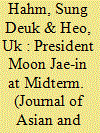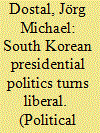|
|
|
Sort Order |
|
|
|
Items / Page
|
|
|
|
|
|
|
| Srl | Item |
| 1 |
ID:
181692


|
|
|
|
|
| Summary/Abstract |
There are two power transitions under way on the Korean Peninsula. Firstly, there is a US–China power transition, reflecting China’s emergence as an economic and military power in Northeast Asia. This is challenging US regional dominance. The second transition reflects South Korea’s development of an independent defence capability against North Korea. A consensus has emerged among Chinese scholars and analysts in government think tanks that these two trends have encouraged South Korea to place itself at greater distance from the United States and China, and to pursue an independent policy toward North Korea that supports Chinese policy preferences. Chinese understanding of the dual power transition is reflected in Beijing’s policies toward South Korea, North Korea and denuclearisation. China no longer contributes to North Korea’s diplomatic isolation or to sanctions regimes against it, with implications for US policy.
|
|
|
|
|
|
|
|
|
|
|
|
|
|
|
|
| 2 |
ID:
193636


|
|
|
|
|
| Summary/Abstract |
How do China and South Korea see their relationship after 30 years of normalization, and why have views shifted since 2017? Research on perceptions and their foreign policy implications usually draws from official discourse and public opinion. This review essay assesses the nature and drivers of China-South Korea mutual perceptions by comparing their academic literature on bilateral relations. Scholarly accounts may offer longer-term interpretations of specialized interests, and a fuller picture of how and why views vary. On both sides of the China-South Korea academic debate, the quantitative volume of studies and qualitative appraisal of relations declined in the 2017–2021 Xi Jinping-Moon Jae-in period. Levels of optimism/pessimism vary by issue-area. Views of third-party constraints on security relations, and domestic political influences on societal relations, drive mutual pessimism. Koreans are more pessimistic about the economic partnership and reassess historical relations more unfavourably, which trace back to views of relative dependence and hierarchy. Three implications emerge for post-2022 relations in light of leadership transition in Beijing and Seoul. Enduring security priorities require minimum strategic interdependence and stronger trust-building mechanisms. Positive functional spillovers from economic and local/nonstate cooperation remain in question. And lasting cultural costs of political disputes compel joint efforts to enhance mutual understanding. Overall, shifts in structural and ideational factors that historically drove normalization are driving the current discord, and prompting both sides to lower future expectations of each other.
|
|
|
|
|
|
|
|
|
|
|
|
|
|
|
|
| 3 |
ID:
188437


|
|
|
|
|
| Summary/Abstract |
After some two decades of growing partnership between Seoul and Tehran, South Korea’s bilateral relationship with Iran reached a bottom of absolute gloom under the leadership of Moon Jae-in. Most of his presidency coincided with the administration of Donald Trump who followed a relatively contrasting approach toward the North Korean and Iranian nuclear issues. Washington’s Pyongyang and Tehran policies were naturally bound to create opportunities as well as troubles for the Moon-led Korean government’s dealing with North Korea and Iran. Arguing from a perspective of strategic choice, this study asserts that Moon almost forfeited the ROK’s commercial interests in Iran for the sake of advancing his North Korean agenda. As a corollary, the South Korean–Iranian ties sank to an all-time low, culminating in unprecedented diplomatic tensions between the two countries over the issue of Iran’s oil incomes frozen in Seoul. The Mideast country’s subsequent resort to gunboat diplomacy by seizing a Korean oil tanker in the Persian Gulf did also little to break the gridlock over the dilemma of blocked assets because any satisfactory and lasting solution regarding this intractable trouble largely hinged on resolving the fate of Iran’s nuclear deal between Tehran and Washington.
|
|
|
|
|
|
|
|
|
|
|
|
|
|
|
|
| 4 |
ID:
167950


|
|
|
|
|
| Summary/Abstract |
The years 2017–2019 have been remarkable in the long stand-off with North Korea,
as much for the drama of war-threats and then summits, as for the durability of the
North Korean status quo. Indeed, given all the sturm-und-drang of both hawkish
and then dovish approaches to North Korea since 2017, the greatest surprise is how
little both alternatives have accomplished ‘on the ground.’ This essay investigates
surprise—why is the North Korean status quo so persistent? Specifically, why
have the hawkish and dovish deviations from the status quo since 2017 so failed
to change much? Several hypotheses derived from levels of analysis theory in
international relations are suggested. In brief, a leader level analysis would focus
particularly on Trump’s personality—his swings of interest, his personalistic
bargaining style, his sloth, his chaotic staffing. A domestic analysis would identify
the divisions within both the United States and South Korea over policy toward
the North. And a structural answer would posit the value of nuclear deterrence
as the cause particularly of Trump’s failure to budge Pyongyang. Because North
Korean intentions, particularly Kim’s psychological preferences, are only poorly
discernible, assigning causal weight to each hypothesis is quite difficult so long as
the North’s opacity persists. Hence this essay focuses on concept and hypothesis
development while nonetheless laying out what evidence there is.
|
|
|
|
|
|
|
|
|
|
|
|
|
|
|
|
| 5 |
ID:
175112


|
|
|
|
|
| Summary/Abstract |
Despite the unsuccessful outcomes of his policies on economic growth and North Korea, Moon Jae-in at midterm has received relatively high levels of job approval ratings compared to his immediate predecessors. What made it possible for him to maintain these ratings? To analyze this puzzle, we employed the three commonly noted leadership qualities—effective communication, political skill, and organizational capacity—suggested by presidential study scholars. We found that Moon Jae-in’s leadership qualities are not the compelling reason for his relatively high approval ratings. Instead, there are three alternative reasons for Moon Jae-in’s relatively high approval ratings: (a) better handling of the media; (b) collapse of the conservatives; and (c) multiple summit meetings with Donald Trump and Kim Jong-un. The latter two reasons are contextual factors, which are our theoretical contribution to the literature.
|
|
|
|
|
|
|
|
|
|
|
|
|
|
|
|
| 6 |
ID:
155420


|
|
|
|
|
| Summary/Abstract |
The impeachment of President Park Gyeun-hye on 10 March 2017 saw South Korean politics enter a period of crisis. Her removal from office, the result of an unprecedented mass movement of citizen protests, provided a springboard for the subsequent success of the liberal candidate, Moon Jae-in, in the presidential election of 9 May 2017. This article suggests that political change in South Korea is only possible if actors move beyond the politics of personality, and tackle the structural reasons for the policy failures of recent times. Further, if democracy, a humane economic system and responsive political institutions are going to be developed and nourished, the country's ‘imperial presidency’ needs to be reformed. In particular, the current ‘winner-takes-all’ politics, with the presidency as the main locus of power, needs to be reformed in ways that promote a more balanced political system, increasing the influence of other actors and institutions.
|
|
|
|
|
|
|
|
|
|
|
|
|
|
|
|
| 7 |
ID:
183785


|
|
|
|
|
| Summary/Abstract |
Since South Korea announced its plan to build an aircraft carrier, the country’s politicians, defence analysts and opinion leaders have engaged in heated debate. Supporters argue that Seoul’s new carrier will provide better protection of South Korea’s maritime interests and serve as a more credible deterrent against North Korea. Critics have raised concerns about the carrier’s cost, its strategic utility and the risk of entanglement in a US–China confrontation. The fate of South Korea’s carrier programme is likely to be determined by its level of parliamentary support, the outcome of the country’s presidential election and Seoul’s grand strategy.
|
|
|
|
|
|
|
|
|
|
|
|
|
|
|
|
|
|
|
|
|